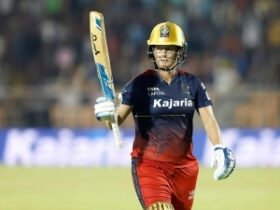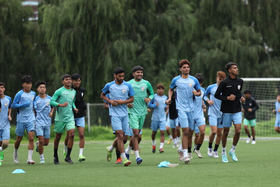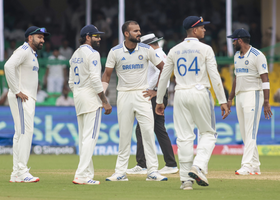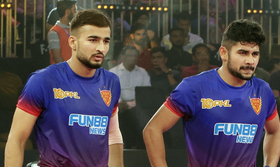New Delhi, Sep 27 (VOICE) Since her international debut as a 15-year-old in 2019, Shafali Verma’s rise in the Indian team has been a sight to behold. Through her brute force and fearless big-hitting, a totally different style of play as compared to other India women batters, the opener from Rohtak has always delighted fans with her belligerent knocks.
By 2021, Shafali also became the youngest cricketer from India across genders to play all three formats internationally. But as is the case in top-flight cricket, there are ups and downs, with flaws in her batting coming to the fore. Bowlers outclassed Shafali with well-directed short balls cramping her for room, coinciding with a phase where her batting returns blowed hot and cold.
Now, five years on, on the cusp of playing her third T20 World Cup, Shafali tells what’s changed for her ever since she took the 2020 edition of the tournament by storm through her sizzling strokeplay. “In 2020, I used to hit on every ball and then it clicked at the start. But then, after some time, there is video analysis starting on your game and they start to see your whole game plan.”
“So, they slowly start to realise what are the strengths and weaknesses of Shafali. I didn’t do that well in 2023, but I got to learn a lot as I went through bad patches and realised the importance of mentality in cricket in last three-four years. So, whatever I learnt in those years, I am implementing all those learnings in 2024.
“I have changed a lot mentally, as initially the mindset would be to go out and hit on every ball. But now I feel like I can wait for one-two balls and then play my shots. When your game plan gets better mentally, then your consistency increases,” says Shafali in a conversation with VOICE, held earlier this month during clothing brand QUA’s shoot in New Delhi.
Shafali’s previous experience of playing cricket in the UAE came via 2020 Women’s T20 Challenge, where her team Velocity didn’t enter the final. With slow conditions expected to be on offer in the UAE, Shafali stressed on quick adapting abilities to be the key for success with the bat, and combined it with calmness as well as waiting for one extra second to play in Dubai and Sharjah.
She also likes to bowl and is hoping to get some overs of her off-spin bowling during India’s matches in the tournament. It’s a no-brainer that the Women’s T20 Challenge catapulted Shafali into national reckoning and the three-team competition making way for the Women’s Premier League (WPL) has got more domestic women cricketers to rub shoulders with overseas players, with the likes of Shreyanka Patil, Sajana Sajeevan, and Asha Sobhana making the cut for the T20 World Cup.
For Shafali, opening the batting and learning from Australia’s five-time World Cup winning captain Meg Lanning in the Delhi Capitals has been a hugely inspirational thing. “The foreign players teach us a lot of things, like Meg is so very calm. I have learnt a lot from her in the first two seasons, and I am really keen to be under her again for the third season.”
Shafali hasn’t played in the WBBL or The Hundred after 2021 as she wants to work more on her fitness and mental levels, as playing in overseas leagues showed her importance of fitness in having a long-term playing career.
It’s no secret in the cricketing circuit that on her day, Shafali tears into bowling attacks apart with explosive force, inviting comparisons with another fearless striker of the ball – Virender Sehwag. An example of this was her remarkable 205 off just 197 balls in the Chennai Test against South Africa in June, and claim record of fastest double-century in women’s Tests.
There are tons of similarities between Sehwag and Shafali – both hit a boundary to bring up their maiden Test centuries against the same opposition (South Africa). Co-incidentally, both hold the record for the fastest double hundred by Indians in Tests – coming in 194 balls.
Being compared with someone like Sehwag, who Shafali adored alongside Sachin Tendulkar, in her growing-up years is a very big deal for her. “I got to learn a lot from Sehwag, like the way he used to hit from the first ball, was a very fearless thing. Sometimes I see some of his batting videos, and when I got my 200, I was very happy and emotional because I was playing for so many years, and didn’t get to hit a hundred for India.”
The changed mentality of settling down and then going for a scoring onslaught reflected in her record double century in Chennai. “After I got my hundred, I had it in my mind to play a long innings and not leave it here, because I knew about the bad patches I had and how much I struggled through it. Plus, it’s very rare to play such a long innings.”
“But that day, everything was going so well, as the plan was to take it as long as possible. I was very happy with that innings and the record too. Things like power-hitting skills are something which we learn as kids in childhood, and I have worked on it for a long time.
“Now it has become very natural for me. But it’s not like that with it becoming very natural to me that I will stop working hard on it. I still work hard on that aspect every week and it becomes very important to hone it.”
Navigating the ups and downs of playing international cricket has made Shafali aware about challenges of making mental switches as quickly as possible when formats change, which she admits becomes tougher when runs don’t come frequently.
“In T20, the requirement is that you have to hit bad balls out of the ground, while playing Test cricket, more calmness is needed. In ODIs, you need both calmness and hitting the bad balls for boundaries. So, whenever there is a format change, I try to switch mentally quickly, as we have T20Is, then ODIs and Tests, which makes it very difficult.
“Sometimes when you make a switch, and then you struggle to get runs, then it becomes very challenging. It is very easy to say, but when bad patches are there, it becomes very difficult to make a switch. In Tests, at times, you have to sometimes stop the balls despite them being in my strength areas. It becomes very difficult, but you have to adapt and score well to make runs for the team.”
One of the biggest challenges India has faced in global women’s cricket competitions has been their inability to overcome numerous crunch moments. Like, against Australia in the semi-finals of the 2023 T20 World Cup in Cape Town or falling short against the same opposition in the 2022 Commonwealth Games final in Birmingham.
Shafali has no qualms in admitting India have not been able to do well in those moments of the game in big tournaments previously, and stated the team always has it in their mind to give their best and do well in every game.
A big part of overcoming that, especially mentally, has been a sports psychologist conducting sessions during the Indian team’s camps at the National Cricket Academy (NCA) in Bengaluru in August and just before departing for the World Cup.
Shafali said the sports psychologist worked a lot on breathing skills, and maintaining their mental toughness in matches, apart from helping the team understand that ‘when you are going to lose, how you have to take that step up to make the team win’.
A huge focus point ever since head coach Amol Muzumdar took over has been fielding, especially with India’s performances in this aspect showing fluctuations. Shafali stated the team is putting in the hard yards to convert that minus point into a strong one and is hopeful the fielding unit will shine bright in the World Cup.
In 2023, after leading the Indian team to the ICC U19 Women’s World Cup win in South Africa, the first global title won by a women’s team from the country, Shafali couldn’t hold back her tears of sheer joy and elation. Recalling that day, Shafali states her biggest happiness in cricket always lies in the days when India wins.
“Of course, that U19 World Cup win was a big thing for us. At least, a trophy in women’s cricket came for us. It was a very happy moment for me, and it’s one of the best moments of my life. As players, when the team wins, that is the biggest happiness for us.
“Individual goals and records will keep going on, but when we do well for the team and do our best, like when I get a 50, 100 or 200, then the night goes very well for me always. So, the happiest moment for us in cricket is when the team wins.”
Shafali’s breakout performance in the 2020 Women’s T20 World Cup showed her sheer force as a teenage wonder, leaving the world dazed. Now, four years since then, Shafali has undergone essential changes in her batting mindset and overcome multiple obstacles.
By blending sheer force with consistency, Shafali has refined her method to madness, which is poised to create an unforgettable happy night for herself and the Indian team if all goes well on October 20 in Dubai.
–VOICE
nr/bc














Leave a Reply